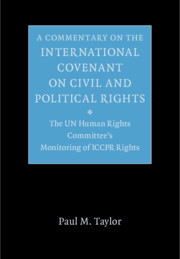 A Commentary on the International Covenant on Civil and Political Rights
A Commentary on the International Covenant on Civil and Political Rights Book contents
- A Commentary on the International Covenant on Civil and Political Rights
- A Commentary on the International Covenant on Civil and Political Rights
- Copyright page
- Contents
- Foreword
- Preface
- Table of Cases (Views of the Human Rights Committee)
- Table of Treaties (in chronological order)
- Abbreviations
- Introduction
- Article 1: Self-determination
- Article 2: To ‘Respect and to Ensure’ Covenant Rights
- Article 3: The Equal Right of Men and Women to the Enjoyment of Covenant Rights
- Article 4: Derogation in Times of Officially Proclaimed Public Emergency Threatening the Life of the Nation
- Article 5: Bar on Interpreting the Covenant in Abuse of Rights
- Article 6: The Right to Life
- Article 7: Torture, Cruel, Inhuman or Degrading Treatment or Punishment
- Article 8: Slavery, Servitude and Forced or Compulsory Labour
- Article 9: Liberty and Security
- Article 10: Treatment of Those Deprived of Their Liberty
- Article 11: Imprisonment for Inability to Fulfil a Contractual Obligation
- Article 12: Freedom of Movement of the Person
- Article 13: Procedural Safeguards in the Expulsion of Aliens
- Article 14: Fair Trial Rights
- Article 15: Retroactive Criminal Law
- Article 16: Recognition as a Person Before the Law
- Article 17: Privacy, Home, Correspondence; Honour and Reputation
- Article 18: Freedom of Thought, Conscience and Religion
- Article 19: Freedom of Expression
- Article 20: Propaganda for War and Hate Speech
- Article 21: Freedom of Assembly
- Article 22: Freedom of Association
- Article 23: Protection for the Family
- Article 24: Protection Required for Children
- Article 25: Right to Participate in Public Affairs, Electoral Rights and Access to Public Service
- Article 26: Equality before the Law Equal Protection of the Law
- Article 27: Ethnic, Religious and Linguistic Minorities
- Bibliography
- List of Concluding Observations (to Reporting States) by Human Rights Committee Sessions
- International Covenant on Civil and Political Rights
- Index
Introduction
Published online by Cambridge University Press: 11 June 2020
- A Commentary on the International Covenant on Civil and Political Rights
- A Commentary on the International Covenant on Civil and Political Rights
- Copyright page
- Contents
- Foreword
- Preface
- Table of Cases (Views of the Human Rights Committee)
- Table of Treaties (in chronological order)
- Abbreviations
- Introduction
- Article 1: Self-determination
- Article 2: To ‘Respect and to Ensure’ Covenant Rights
- Article 3: The Equal Right of Men and Women to the Enjoyment of Covenant Rights
- Article 4: Derogation in Times of Officially Proclaimed Public Emergency Threatening the Life of the Nation
- Article 5: Bar on Interpreting the Covenant in Abuse of Rights
- Article 6: The Right to Life
- Article 7: Torture, Cruel, Inhuman or Degrading Treatment or Punishment
- Article 8: Slavery, Servitude and Forced or Compulsory Labour
- Article 9: Liberty and Security
- Article 10: Treatment of Those Deprived of Their Liberty
- Article 11: Imprisonment for Inability to Fulfil a Contractual Obligation
- Article 12: Freedom of Movement of the Person
- Article 13: Procedural Safeguards in the Expulsion of Aliens
- Article 14: Fair Trial Rights
- Article 15: Retroactive Criminal Law
- Article 16: Recognition as a Person Before the Law
- Article 17: Privacy, Home, Correspondence; Honour and Reputation
- Article 18: Freedom of Thought, Conscience and Religion
- Article 19: Freedom of Expression
- Article 20: Propaganda for War and Hate Speech
- Article 21: Freedom of Assembly
- Article 22: Freedom of Association
- Article 23: Protection for the Family
- Article 24: Protection Required for Children
- Article 25: Right to Participate in Public Affairs, Electoral Rights and Access to Public Service
- Article 26: Equality before the Law Equal Protection of the Law
- Article 27: Ethnic, Religious and Linguistic Minorities
- Bibliography
- List of Concluding Observations (to Reporting States) by Human Rights Committee Sessions
- International Covenant on Civil and Political Rights
- Index
Summary
The Charter of the United Nations ushered in a lasting global advance in the protection of human rights when in 1945 it pronounced a determination to ‘reaffirm faith in fundamental human rights, in the dignity and worth of the human person’, and it made the solemn pledge to promote ‘universal respect for, and observance of, human rights and fundamental freedoms for all without distinction as to race, sex, language, or religion’. The Universal Declaration adopted just over three years later was a remarkable achievement in identifying and articulating for the first time the core set of rights warranting recognition, in spite of struggles by certain powers to cling to cherished aspects of their domestic systems. Those same rights were elaborated into binding form in a more challenging process over the ensuing eighteen years in the International Covenant on Civil and Political Rights (the Covenant) and the International Covenant on Economic, Social and Cultural Rights (ICESCR), both adopted on the same day in December 1966 and known as ‘the twin Covenants’.
- Type
- Chapter
- Information
- A Commentary on the International Covenant on Civil and Political RightsThe UN Human Rights Committee's Monitoring of ICCPR Rights, pp. 1 - 35Publisher: Cambridge University PressPrint publication year: 2020


